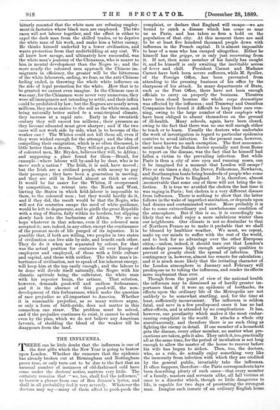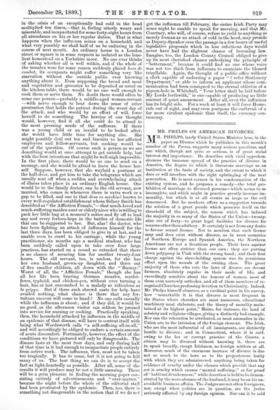THE INFLUENZA. T HERE can be little doubt that the influenza
is one of the first gifts which the New Year is going to bestow upon London. Whether the rumours that the epidemic has already broken out at Birmingham and Nottingham prove true, or only turn out to be due to the fact that an unusual number of instances of old-fashioned cold have come under the doctors' notice, matters very little. The certainty remains that " we, too, shall feel the influence," to borrow a phrase from one of Ben Jonson's lyrics, and shall in all probability feel it very severely. Whatever the doctors may say—many of them affect to pooh-pooh the complaint, or declare that England will escape—we are bound to catch a disease which has come so near us as Paris, and has taken so firm a hold on the population of that city. At this moment there are said to be at least five hundred thousand people down with influenza in the French capital. It is almost impossible to hear of a man who has escaped altogether. Either he himself has the grippe, or is only just recovering from it. If not, then some member of his family has caught it, and he himself is only awaiting the inevitable access of fever and chill. President Carnot and Madame Carnot have both been severe sufferers, while M. Spuller, of the Foreign Office, has been prevented from attending to the pressing business of his office by the sharpness of his attack. In many departments of State, such as the Post Office, there have not been enough officials to carry on properly the business. Theatres have been closed because the whole corps dramatigv,e was affected by the influenza ; and Tramway and Omnibus. Companies have found it difficult to keep their cars run- ning, owing to the large number of their employis who have been obliged to absent themselves on the ground of ill-health. Many schools, again, have been closed, owing to the fact that there was no one well enough either to teach or to learn. Usually the doctors who undertake the work of investigation in regard to particular epidemics contrive to avoid infection. In the present case, however, they have known no such exemption. The first announce- ment made by the Italian doctor specially sent from Rome to report on the disease, was the fact that he himself had fallen a victim to the prevailing infection. But while Paris is thus a city of sore eyes and running noses, can it be imagined for a moment that London will escape ? Five or six times a day, the Dover, Folkestone, Newhaven, and Southampton boats bring hundreds of people who come straight from Paris to England. It is, therefore, almost :nconceivable that some one of these will not bring the in- fection. It is true we avoided the cholera the last time it was raging in Paris ; but cholera is a very different disease from influenza. There is nothing to show that the latter follows in the wake of imperfect sanitation, or depends upon bad drains and contaminated water. More probably it is due to some extraordinary and unwholesome condition of the atmosphere. But if this is so, it is exceedingly un- likely that we shall enjoy a more salubrious winter than our neighbours. Our climate is not so dissimilar to that of Northern France as to make it probable that we shall be blessed by healthier weather. We must, we repeat, make up our minds to suffer with the rest of the world, and to look for no advantage over the other European cities,—unless, indeed, it should turn out that London's smoke-fogs possess high enough antiseptic qualities to prevent or greatly check the spread of infection. This contingency is, however, almost too remote for calculation ; and it is much more likely that the irritating character of the London atmosphere in January and February will predispose us to taking the influenza, and render its effects more unpleasant than ever. Though from the point of view of the national health the influenza may be dismissed as of hardly greater im- portance than if it were an epidemic of toothache, its effects upon the ordinary life of the Metropolis are not unlikely to be somewhat startling, and, for the time at least, sufficiently inconvenient. The influenza is seldom fatal, and save in a few predisposed cases it has no bad after-effects, and is attended by no complications. It has, however, one peculiarity which makes it the most embar- rassing complaint in the world. It attacks a Whole city simultaneously, and therefore there is no such thing as fighting the enemy in detail. If one member of a household gets the disease, every other member, no matter what pre- cautions are taken, gets it also. They catch it, too, practically all at the same time, for the period of incubation is not long enough to allow the master of the house to recover before his wife has begun to sicken. Then, too, the doctors, who, as a rule, do actually enjoy something very like the immunity from infection with which they are credited. by the general public, invariably take the influenza. It often happens, therefore—the Paris correspondents have been describing plenty of such cases—that every member of a family, masters and servants alike, all fall victims at once to a disorder which, though so little dangerous to life, is capable for two days of- prostrating the strongest man. Imagine each inmate of an ordinary English home in the crisis of an exceptionally bad cold in the head multiplied ten times,—that is, feeling utterly weary and miserable, and incapacitated for some forty-eight hours from all attendance on his or her regular duties. That is what happens when the influenza seizes on a household, and what very possibly we shall half of us be enduring in the course of next month. An ordinary house in a London street or square is in some respects as isolated as the lone- liest homestead on a Yorkshire moor. No one ever thinks of asking whether all is well within, and if the whole of the inmates were for some reason suddenly placed hors de combat, its occupants might suffer something very like starvation without the outside public ever knowing anything about it. Even supposing the bread and meat and vegetables and groceries to be deposited as usual on the kitchen table, there would be no one well enough to cook them or serve them. No doubt there would often be some one person—probably a middle-aged woman-servant —with nerve enough to beat down the sense of utter prostration that holds the patient during the worst day of the attack, and who would by an effort of will, force herself to do something. The heroine of our thought would, however, find it all she could do to attend to the most pressing needs of the sufferers. If there was a young child or an invalid to be looked after, she would have little time for anything else. She might possibly deal out tea and biscuits to her afflicted employers and fellow-servants, but cooking would be out of the question. Of course such a person as we are describing would at once attempt to get outside help, but with the best intentions .that might be well-nigh impossible. In the first place, there would be no one to send on a message, and she would be afraid to leave the house her- self. Suppose, however, that she waylaid a postman at the hall-door, and got him to take the telegrams which are usually sent off when a sudden and overwhelming attack of illness takes place in an ordinary English house. One would be to the family doctor, one to the old servant, now married, who comes in whenever there is extra work or a gap to be filled, and one to that deus ex machind known to every well-regulated establishment whom Sidney Smith has described as " the Affliction Female,"—that much-loved and much-suffering maiden aunt or elderlyniece who is willing to pack her little bag at a moment's notice and fly off to lead any and every forlorn-hope in the battles of domestic life that can be suggested to her. But, alas ! the doctor, who has been fighting an attack of influenza himself for the last three days, has been obliged to give in at last, and is unable even to crawl to his carriage ; while the young practitioner, six months ago a medical student, who has been suddenly called upon to take over four large practices, has started on a round so extended that there is no chance of securing him for another twenty-four hours. The old servant, too, is useless, for she has her own husband, grown-up daughter, and three out of five smaller children, all down with the " 'fluenzy." Worst of all, the " Affliction Female," though she has all her life been braving German measles, scarlet- fever, typhoid, and chicken-pox, without ever turning a hair, has at last succumbed to a malady so ridiculous as la grippe. But if three such shrewd casts for help have availed nothing, what chance is there that any for- tuitous succour will come to hand ? No one calls casually while the influenza is about ; and if they did, it would be no good, as the afternoon visitor can seldom be pressed into service for nursing or cooking. Practically speaking, then, the household attacked by influenza in the middle of an epidemic of that disease, will have to content itself with being what Wordsworth calls "a self-sufficing all-in-all," and will accordingly be obliged to endure a certain amount of acute discomfort. Fortunately, however, the effect of the conditions we have pictured will only be disagreeable. The disease lasts at the most four days, and only during half of that time is it bad enough to incapacitate people entirely from active work. The influenza, then, must not be taken too tragically. It has to come, but it is not going to kill many of us. The best thing we can do is to accept the fact as light-heartedly as possible. After all, some of the results it will produce may be not a little amusing. There will be a grim pleasure in finding the morning paper con- sisting entirely of advertisements and " over-matter," because the night before the whole of the editorial staff had been prostrated by the epidemic. Then, too, there is something not disagreeable in the notion that if we do not get the influenza till February, the entire Irish Party may Some night be unable to speak for sneezing, and that Mr. Courtney, who will, of course, refuse to yield to anything so merely human as an attack of cold in the head, may preside as Deputy-Speaker over the passage in a few hours of useful legislative proposals which in less infectious days would never have had the slightest chance of becoming law. Imagine, too, the London County Council obliged to give up its most cherished clauses embodying the principle of " betterment," because it could find no one whose voice was not too thick from influenza to enunciate the blessed trisyllable. Again, the thought of a public office without a clerk capable of endorsing a paper " refer Stationery Department," or able to inform an applicant whose com- munication had been consigned to the eternal oblivion of a pigeon-hole in Whitehall, " Your letter shall be laid before My Lords forthwith," is one capable of producing no little amount of quiet amusement. After all, even the influenza has its bright side. For a week at least it will force Home- rule out of sight, and may even postpone the outbreak of a far more virulent epidemic than itself, the currency con- troversy.



































 Previous page
Previous page